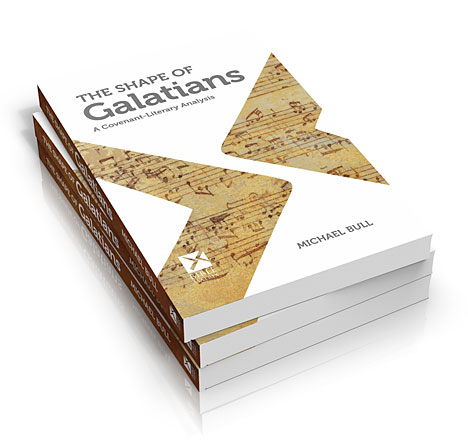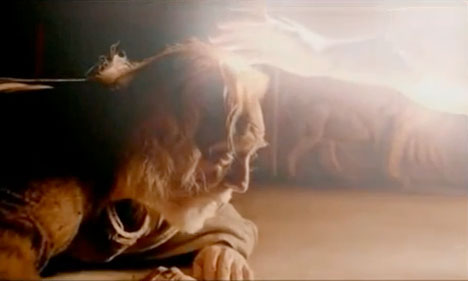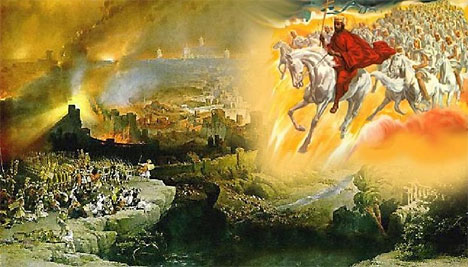Mar
25
2014

The Shape of Galatians: A Covenant-Literary Analysis is now available on amazon. An ebook edition will follow shortly. As of writing, the ‘look inside’ function is not yet functional, but the introduction is as follows: Continue reading
Comments Off | tags: Galatians, The Shape of Galatians | posted in Bible Matrix, Biblical Theology
Mar
19
2014

And I looked, and behold, a black horse! And its rider had a pair of scales in his hand. (Revelation 6:5)
The book of Revelation is a mystery, yet like all good mysteries it is a book made entirely of clues. It is a glimpse through the torn veil of the Temple, that is, the flesh of Jesus, into the heavenlies. The cloud into which He was taken up is opened to John’s eyes that he might see the horses and chariots of God (2 Kings 6:17). But John is a prophet who knows the Bible, and like John we will only understand the symbols if we know the Bible. The conversation at God’s table is for those who know their Master’s mind, who hear His voice as children and thus quit themselves like men. To them, this is indeed a Revelation. To those outside His commission, it remains an enigma, terrible lightning and thunder and the sound of trumpets (Exodus 19:19; 20:18).
This post has been slain and resurrected for inclusion in my 2015 book of essays, Inquietude.
Continue reading
Comments Off | tags: Daniel, Exodus, James B. Jordan, Numbers, Revelation, Tabernacle | posted in Bible Matrix, Biblical Theology
Mar
17
2014

“Modern commentators seem to overlook the promise of children in Genesis 1, and how these unmentioned ‘innocents,’ yet in Adam’s loins, are silent but crucial characters in Genesis 3.”
When Paul refers to Abraham as the father of all who believe, the one through whom all nations would be blessed (Romans 4:9-22), we must be prepared to interpret his inspired words through the lens of the House of God, the ever-present architecture of Eden.
The Name of the Father
God’s household in heaven was a tent of servants—the angels—but there was only one Son, through whom came all Creation. This means that the first verses of John’s Gospel, which describe the pre-incarnate Word, can tell us a great deal about God’s intentions for Adam, the incarnate image of God. All that Jesus was in heaven, Adam was to be on earth:
This post has been slain and resurrected for inclusion in my 2015 book of essays, Inquietude.
Continue reading
Comments Off | tags: Abraham, Covenant Theology, Feasts, Genesis, Literary Structure, Tabernacle | posted in Bible Matrix, Biblical Theology
Mar
10
2014

For as in those days before the flood they were eating and drinking, marrying and giving in marriage, until the day when Noah entered the ark, and they were unaware until the flood came and swept them all away, so will be the coming of the Son of Man. (Matthew 24:38-39)
Most disputes concerning the meaning of the Scriptures are not due to a lack of trying when it comes to hermeneutics. They result from a lack of due process. By this, I do not mean the process of interpretation but the identification in the Scriptures of the processes of God.
An example would be the meaning of Christ’s words concerning the unpardonable sin, which have terrified many Christians unnecessarily. Blasphemy against the Spirit is unpardonable not because it is the worst sin. It is unpardonable because it is the last sin.
This post has been slain and resurrected for inclusion in my 2015 book of essays, Inquietude.
Continue reading
2 comments | tags: AD70, Babylon, Covenant Theology, Genesis, Hebrews, Herod, Matthew, Matthew 24, Nebuchadnezzar, Noah, Numbers | posted in Bible Matrix, Biblical Theology, Christian Life, The Last Days
Mar
7
2014

“Truly, truly, I say to you, (Transcendence)
the Son can do nothing of his own accord, (Hierarchy)
but only what he sees the Father doing. (Ethics)
For whatever the Father does, (Oath/Sanctions)
that the Son does likewise.” (Succession)
(John 5:19)
The premise that the entire text of the Bible has a common structure, one which operates at multiple levels, has many implications. Besides the fact that this is clearly a miracle, there is the question of why such a limitation would be placed upon the Words of God.
This post has been slain and resurrected for inclusion in my 2015 book of essays, Inquietude.
Continue reading
5 comments | tags: Christopher Hitchens, Covenant Theology, Culture, Education, Ezekiel, James Jordan, John, Richard Dawkins | posted in Apologetics, Bible Matrix, Biblical Theology, Christian Life
Feb
28
2014

Jesus’ reference to Daniel 7 in Matthew 26:64 (and Mark 14:62) is a source of some confusion. To figure out what is actually going on in Daniel’s vision, we have to go back to Leviticus 16. James Jordan writes:
…when Jesus calls Himself “the Son of Man,” He is referring to Ezekiel, not to Daniel 7 (except perhaps indirectly). Jesus is the Greater Ezekiel. Christians are those who are “like the Son of Man,” like Jesus.
Continue reading
Comments Off | tags: Atonement, Daniel, Ezekiel, High Priest, James Jordan, Leviticus, Systematic typology | posted in Against Hyperpreterism, Bible Matrix, Biblical Theology, The Last Days
Feb
24
2014
Bauhaus and the Bible

“What is in the nature of these materials?”
The Bauhaus, founded in Germany in 1919 by architect Walter Gropius, had a profound influence in every area of design, from graphics and typography to clothing, furniture and architecture. The institution was not so much a style as a method, its philosophy based on the idea that if something is well-designed it will be beautiful of its own accord. The means to this end involved the founding of an art school where every student was also a tradesman, and every tradesman was also an artist. The Bauhaus manifesto expresses Gropius’ desire to unite the trades and the arts that their works might possess the grace of an inseparable marriage of function (design) and form (beauty).
This post has been slain and resurrected for inclusion in my 2015 book of essays, Inquietude.
Continue reading
Comments Off | tags: Culture, Ecclesiology, Postmillennialism, postmodernism, Tabernacle | posted in Apologetics, Bible Matrix, Biblical Theology, Ethics
Feb
22
2014

Many of the obscure and apparently obsolete details in the Torah are hints of events later in the Bible. Some of these details are not what is said but what is not said. And some of these unspoken hints are discernible only through identification of common structures. One example is a line missing from Genesis 1.
Continue reading
Comments Off | tags: Abraham, Covenant Theology, Fractals, Literary Structure, Moses | posted in Bible Matrix, Biblical Theology
Feb
12
2014

“As always, the beauty of the arrangement is breathtaking. It is historical narrative, poetry, legal Covenant and high symbolism all at once… It consists of three Cycles which recapitulate the triune ‘Garden, Land, World’ architecture of the Creation and the Tabernacle.”
Matthew 28: SUCCESSION
The fifth major cycle takes us to the end of the Covenant pattern, from the Covenant Sanctions to Covenant Succession. In the Old Testament, this concerned handing Covenant authority to the faithful of the next generation. It was the blessings of Jacob upon his sons (Garden), and Moses passing the baton of headship of Israel to Joshua (Land). This time, the inheritance was not the Garden Sanctuary of Moses [1] nor the Land of Canaan, but the entire World. Thus, it is no accident that in both cases, in that of Joshua and that of the disciples, He said, “I am with you.” A battle lay ahead.
Continue reading
Comments Off | tags: Baptism, Evangelism, Literary Structure, Matthew, Resurrection, Revelation | posted in Bible Matrix, Biblical Theology, The Last Days
Feb
9
2014

“Show me your tomes, and I will draw you a napkin.”
The usual way to approach a theological problem is to read just about everything written on the subject by just about everybody else, and quote just about every one of them in a book that almost nobody is going to read. And the result most often looks like the same landscape just slightly rearranged. There is little or no progress.
This post has been slain and resurrected for inclusion in my 2015 book of essays, Inquietude.
Continue reading
Comments Off | posted in Bible Matrix, Biblical Theology, Quotes



































